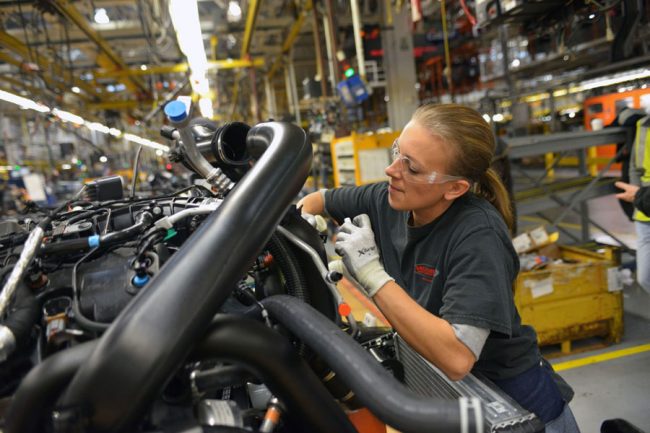
U.S. NAFTA departure would wreak havoc on North American auto industry: report
by Canadian Manufacturing.com Staff

Tearing up free trade agreement would cost tens of thousands of U.S. jobs, devastate parts suppliers in Canada and Mexico as overseas competitors sap market share

Ford’s assembly plant in Dearborn, Mich. According to the report, the Midwest U.S. state would be particularly hard-hit by the U.S. pulling out of NAFTA. PHOTO Ford
ANN ARBOR, Mich.—The North American automotive industry is apprehensively awaiting what could be the most damaging policy decisions in decades.
With the inauguration of Donald Trump one week away—and few concrete answers emerging from the incoming administration on what was one of the President-elect’s campaign pillars—a new Center for Automotive Research report says an American withdrawal from the North American Free Trade Agreement would wreak havoc on the auto industry in not only Mexico and Canada, but also in the U.S.
“Any move by the United States to withdraw from NAFTA or to otherwise restrict automotive vehicle, parts and components trade within North America will result in higher costs to producers, lower returns for investors, fewer choices for consumers, and a less competitive U.S. automotive and supplier industry,” the report says.
Despite Trump’s claims about safeguarding and creating auto manufacturing jobs in the U.S. by cracking down on carmakers building plants south of the border, the study says the fallout from pulling out of NAFTA could cost the U.S. 31,000 auto assembly, engineering and parts jobs.
Related: Auto industry’s relationship with Trump takes dramatic turn
Michigan, which is still the nerve centre of U.S. auto manufacturing, would be particularly hard-hit by the policy decision, but the damage would take its toll on both the major automakers and parts suppliers across the U.S. that sell into the Mexican and Canadian markets.
Meanwhile, the CAR report said small car assembly—one of Trump’s campaign targets—is unlikely to return to the U.S. even after a NAFTA withdrawal, with the automakers simply serving U.S. small car buyers from overseas.
In what was viewed as a Trump victory, for instance, Ford said last week it would cancel a $1.6 billion small car plant planned for San Luis Potosi, Mexico. But even without the new plant, Ford still intends to move production of the Focus compact to Mexico—it will simply invest in upgrades at an existing plant instead.
And Trump is likely to have even less leverage over foreign automakers. Currently more than half of the small cars made in Mexico are built by firms other than Ford, General Motors or Fiat Chrysler. Those foreign producers would have fewer incentives to move production currently located in Mexico to the U.S., the report says.
For Canada and Mexico the stakes are equally high.
Just 12 per cent of the cars Canada produces are sold domestically, while 19 per cent of Mexico’s vehicle production is sold within its own borders. Any potential tariff on imported vehicles could have dire consequences for assembly operations in both countries.
Similarly, auto parts suppliers in Canada and Mexico would face declining fortunes post-NAFTA. The report found China, South Korea and Japan would likely replace the U.S.’s two neighbours as its biggest parts suppliers if Trump followed through on his more extreme position on the free trade agreement.
Still, it remains to be seen what parts of Trump’s often-disparate policy agenda laid out in the marathon election campaign will accompany him to the White House. The President-elect has firmly committed to pulling out of the Trans-Pacific Partnership as soon as he enters office, but has not detailed a plan to deconstruct NAFTA.
You can read the full report here.